Over the past decade we’ve seen the standard for longhaul flying transition from angled-flat and herringbone seats to reverse herringbone flat beds. A month ago I listed a ranking of my favourite business class hard products flying today. Asia is a joy to fly in and out of when in first or business class, since there’s so much competition between a range of different airlines.
However, as the entire industry moves and develops itself, there are some routes that are just stuck behind the times. Most of the time, this is due to structural development, when they need to keep their old planes on certain routes due to their new planes not being rolled out at a quick enough pace. At other times, this is simply due to the logistics of the flight working out when an airline operates a route with an inferior product, where the airline doesn’t feel a need to improve its product on the route due to low yields or excess demand.
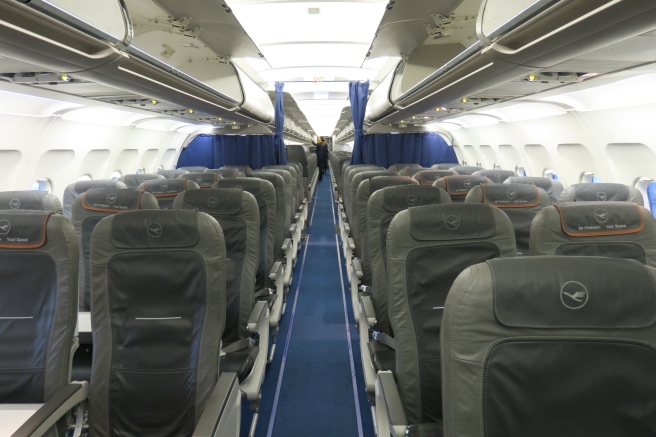
Business class in this cabin for 11 hours? No thank you
I thought it’d be fun to point out some of these routes so you guys know which ones to avoid. First of all, this isn’t a list of the worst business class products out there (I’ve heard unanimously bad things about British Airways’ hard product, so you’ll expect a consistently bad experience no matter what – they’re not on the list). I’m focusing on airlines that have done a lot to invest in and advertise a good premium product, but still operate certain flights with an older or inferior product that isn’t half as comfortable. In other words, I’m focusing on airlines with inconsistent premium products, and specifically, I’m exposing the anomalies.
Korean Air 787/A330 First Class
Korean Air offers a pretty good first class product on a majority of their longhaul flights. Their 747-8s and 777s feature a very nice first class enclosed suite, whereas their 777s feature a pretty good first class seat as well.
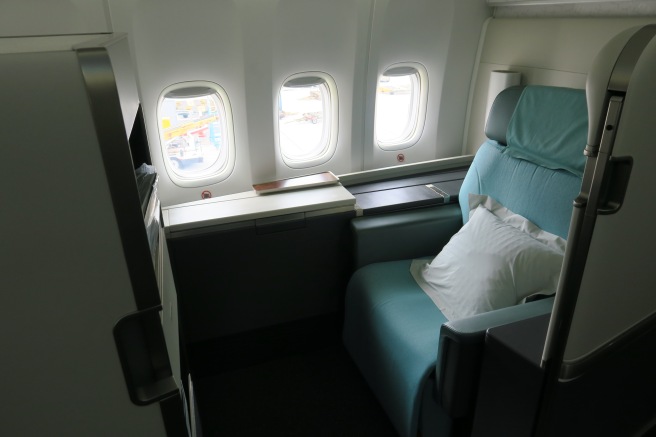
Korean Air Boeing 747-8 First Class
However, their A330s, regional 777-300s and 787s feature the exact same seat in first class as they do in business class. The old A330s fare the worst, as their first class seats are basically a mediocre business class hard product (their 777-300s also feature this, but at least Korean Air is good with sticking their 777-300s on exclusively shorthaul flights):
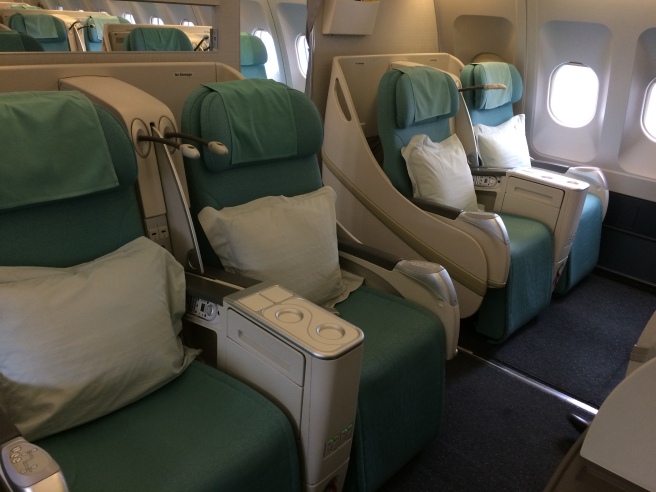
Korean Air Airbus A330 First Class
Their newer A330s and 787s at least feature a spectacular business class hard product (but not as good of a first class product), where you at least get much more privacy and spaciousness:
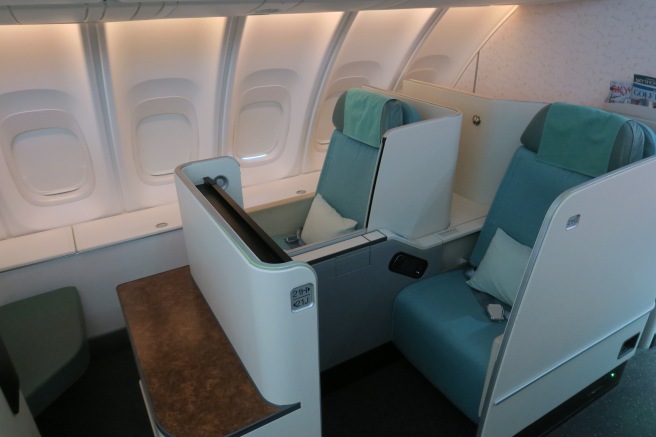
Korean Air Boeing 747-8 Business Class Seats (first class on their newer A330s and 787s feature the exact same seat)
While the old regional A330s are being phased out or kept on shorter routes, their new A330 and 787 network is expanding across “long and thin” (longhaul, low-demand) routes, especially in Australia and Canada. If you’re flying to one of those countries in first class, make sure you’re booking a flight on a 777 or 747, and not a 787 or A330 (if you are, simply book business class, and save your cash).
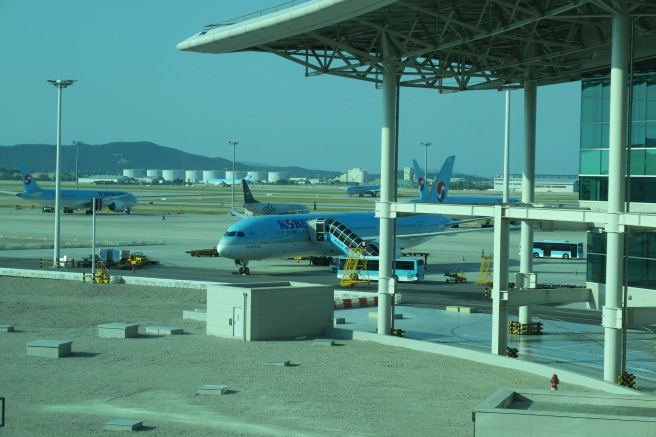
Korean Air Boeing 787 Incheon Airport
Lufthansa A319 Frankfurt to Pune
In Korean Air first class at least you’ll have a comfortable, albeit inferior experience. On this particular route that’ll be run by a Lufthansa A319 for the next two months, you…won’t. Lufthansa has a joint venture with Privatair, which ran a 737 between Frankfurt and Pune on behalf of Lufthansa; unfortunately for some time the two airlines fell out. Frankfurt and Pune is still quite a high-yield route due to the multitude of German companies running businesses in Pune, so Lufthansa launched a direct flight (read: direct, not non-stop) between Frankfurt and Pune using an A319.
The plane will make a fuel stop in Baku, so the total flying time is eleven hours (Baku is roughly halfway between the cities). The airlines have made reparations and Privatair will resume operating the route in February 2019, though between November 2018 and February 2019 Lufthansa will operate the route.
Lufthansa’s A319s feature an all economy-class configuration with 30″ seat pitch. The first few rows are typically sold as business class with the middle seat blocked off. In this case Lufthansa is blocking off the middle and the aisle seats for business class passengers, so each business class passenger gets a block of three seats (that’s around 54″, or 1.37 meters – enough for a small child to lay flat). Oh, and did I mention that Lufthansa has the least comfortable seats out of any economy class airline I’ve flown (their slimline seats have really bad padding)?
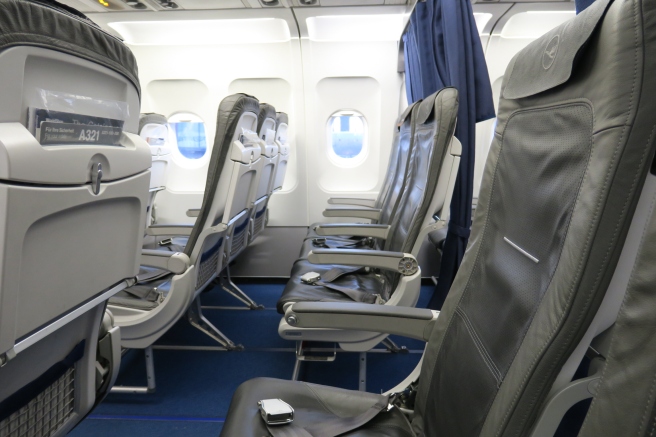
Lufthansa Airbus A321 Business Class Legroom
If you want to get between Frankfurt and Pune, you’re best off booking economy – actually, since the flight isn’t nonstop anyway, you’re best off booking another airline between the two cities, period. This is a far cry from Lufthansa’s still mediocre but at least infinitely better hard product on their widebody, longhaul aircraft.
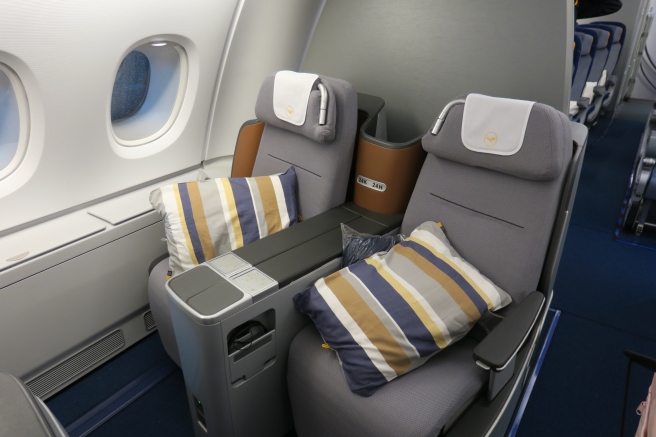
Lufthansa’s (way better) A380 business class
Read more: my review of Lufthansa’s A321 business class from Geneva to Frankfurt
Hong Kong Airlines A330 Hong Kong to Auckland
Hong Kong Airlines has improved significantly over the past few years. They’ve gone from having no direction at all to operating a decent product on select longhaul routes out of Hong Kong. As of now their prices are pretty competitive, due to their support from HNA and their effort to salvage the bad reputation that they’ve carried from their public image six years ago. Nine out of ten times I mention Hong Kong Airlines to my (non-aviation) friends I get a “aren’t they really sh*t?”, but my recent experience in business class on their A330 was every bit as good as Cathay Pacific’s. Their new A350 business class seat on select A350s is one of the best business class seats out there.
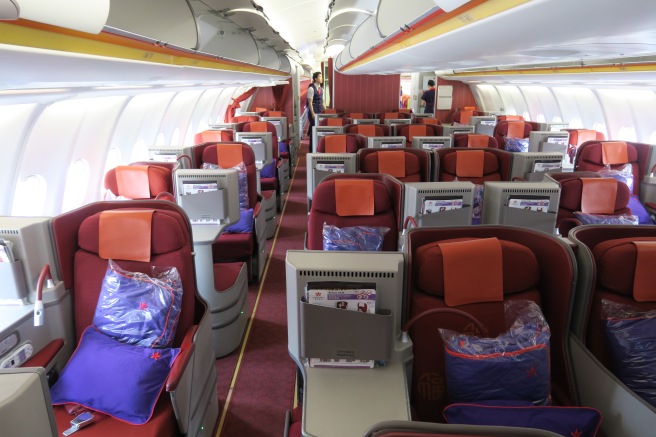
Hong Kong Airlines Airbus A330 Business Class Cabin
However, there’s one longhaul route operated by Hong Kong Airlines that’s remarkedly inferior to its competition. While Cathay Pacific operates an A350 between Hong Kong and Auckland with a top-notch hard product, Hong Kong Airline operates an A330 on the 11-hour flight with…angled flat seats. And while Hong Kong Airlines has A330s that feature my favourite variation of the angled flat seat out there, this is an inferior version of it that a bulk of airlines operated on their longhaul flights 10-15 years ago.
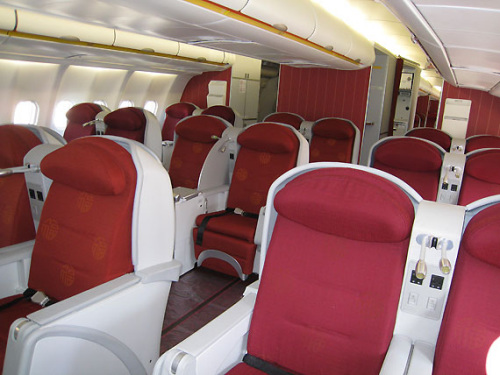
Hong Kong Airlines Airbus A330-200 Business Class
I’m hoping I can try Hong Kong Airlines’ older A330-200 business class soon (just so I can see how much worse it is), but you bet I’d stay away from this Auckland route. If you’re looking to get to Auckland in a premium cabin on the cheap, Singapore Airlines’ business class fares are often pretty attractive if you’re willing to transit (Hong Kong to the South Pacific is one of the “sweet spots” if you’re booking Singapore Airlines business class, in my opinion).
Thai Airways’ 747 and select 777s
Thai Airways has a good (albeit very inconsistent) business class product on a majority of their longhaul fleet. Most of their flights to Europe and the U.S. are operated by staggered seats, with a couple of other lie-flat configurations on offer. However, if you’re flying to select destinations such as Sydney (I’m sure I’m missing more), you’re stuck on Thai Airways’ angled-flat 747, which features an angled flat bed. No thanks for a 9+ hour flight!
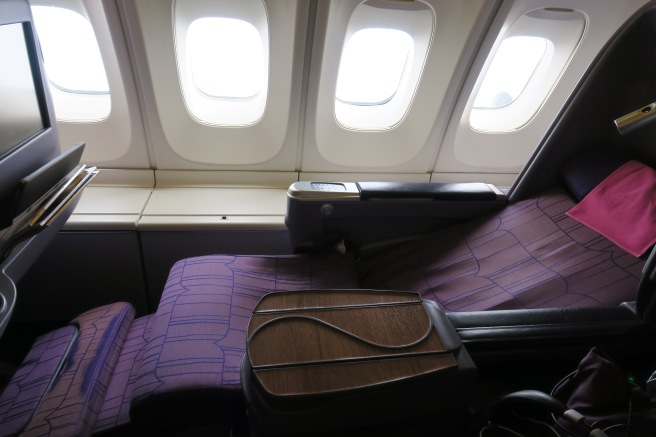
Thai Airways Boeing 747 Business Class Seat Angled Flat
Read more: my review of Thai Airways’ 747 from Bangkok to Hong Kong
Anything by the Emirates 777
Emirates is known for their beautiful A380s, which fuels their ability to get away with a terrible and uncompetitive business class seat on their 777. The seats are laid out in an outdated 2-3-2 configuration, though worse yet, Emirates is the only first-rate airline I know of that continues to offer angled lie flat seats on longhaul flights.
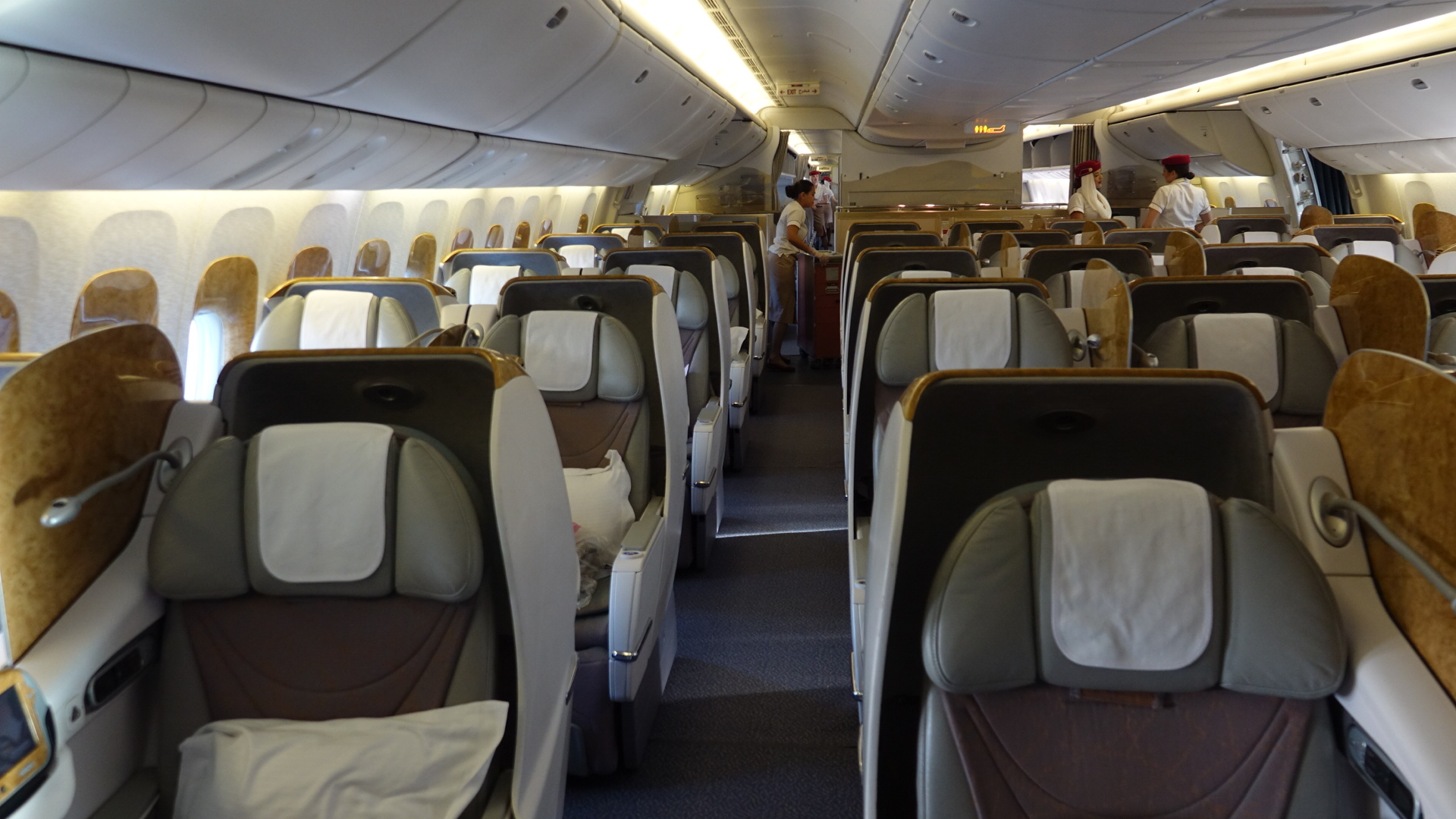
Read more: my review of Emirates’ 777 from Hong Kong to Dubai
Air France’s A380 Business Class
Air France is the only airline to still operate angled flat seats on their A380s, so needless to say they’re badly in need of a retrofit. However, their 777s are much newer, and feature reverse herringbone seats. While Air France no longer operates any A380 flights to Hong Kong, their Shanghai flights are still run with a mix of A380s and 777s, so make sure you get yourself on the latter (at least in first and business class – this is probably one of two cases where I’d recommend flying a 777 over an A380, due to how much I love the plane otherwise – the other case being on Qatar Airways).
The real contention with this is if you’re flying Air France between Paris and an African/U.S. city, where the mixes between A380s and 777s become more common.
United 777-200 Business Class
United has made leapfrogs from where it was four years ago. They’ve transitioned from an airline renowned for a terrible product with bad service, to an airline with a really good premium product. While I’d love to try their Polaris product on their 777-300ER (from what I’ve read, it seems to be living up to the hype), their legacy 777-200s are a reminder of how terrible they were back in the day.
United offers three flights to the U.S. from Hong Kong. The best, and shortest, is from Hong Kong to San Francisco, featuring their latest 777-300ER with their new Polaris product. Their longest flight to Newark features an ex-Continental 777-200, which features a hard product that is still quite good (though not excellent, it’s very similar to Lufthansa business class – no, not the terrible A319 product, but rather their “usual” longhaul product).
The last is to Chicago, which features their old 2008 seats with a 2-4-2 configuration in business class. Yes, the seats go flat, but that’s it for the positives (unless you manage to score one of the eight first class seats that they sell as business class, since United can’t sensibly charge a premium for first class anymore). While only one flight between Hong Kong and the U.S. is operated by one of United’s old legacy 777-200s, obviously this isn’t the only flight from Asia to the U.S. where you’d potentially get stuck rubbing shoulders with three other passengers on a HK$30,000+ ticket.
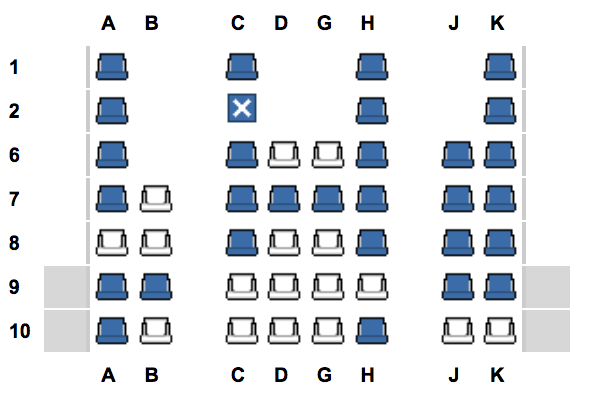
United Boeing 777 Business Class Seatmap
Bottom Line
Premium cabins have come a long way, and can often cost a lot. As a result it’s always good if you can maximise your experience. Listed above are a few products that will NOT help you maximise your experience if you’re looking to try business class on an otherwise top-notch airline – they’re simply isolated hard products that run quite unfortunate longhaul flights. Add that on to the brilliant marketing that most of the airlines above have (in other words, everyone except Korean Air and Lufthansa), and you’ll feel quite ripped off once you’re onboard.
What are your least favourite longhaul business class routes?

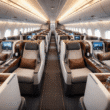
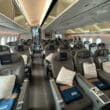
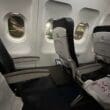
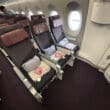
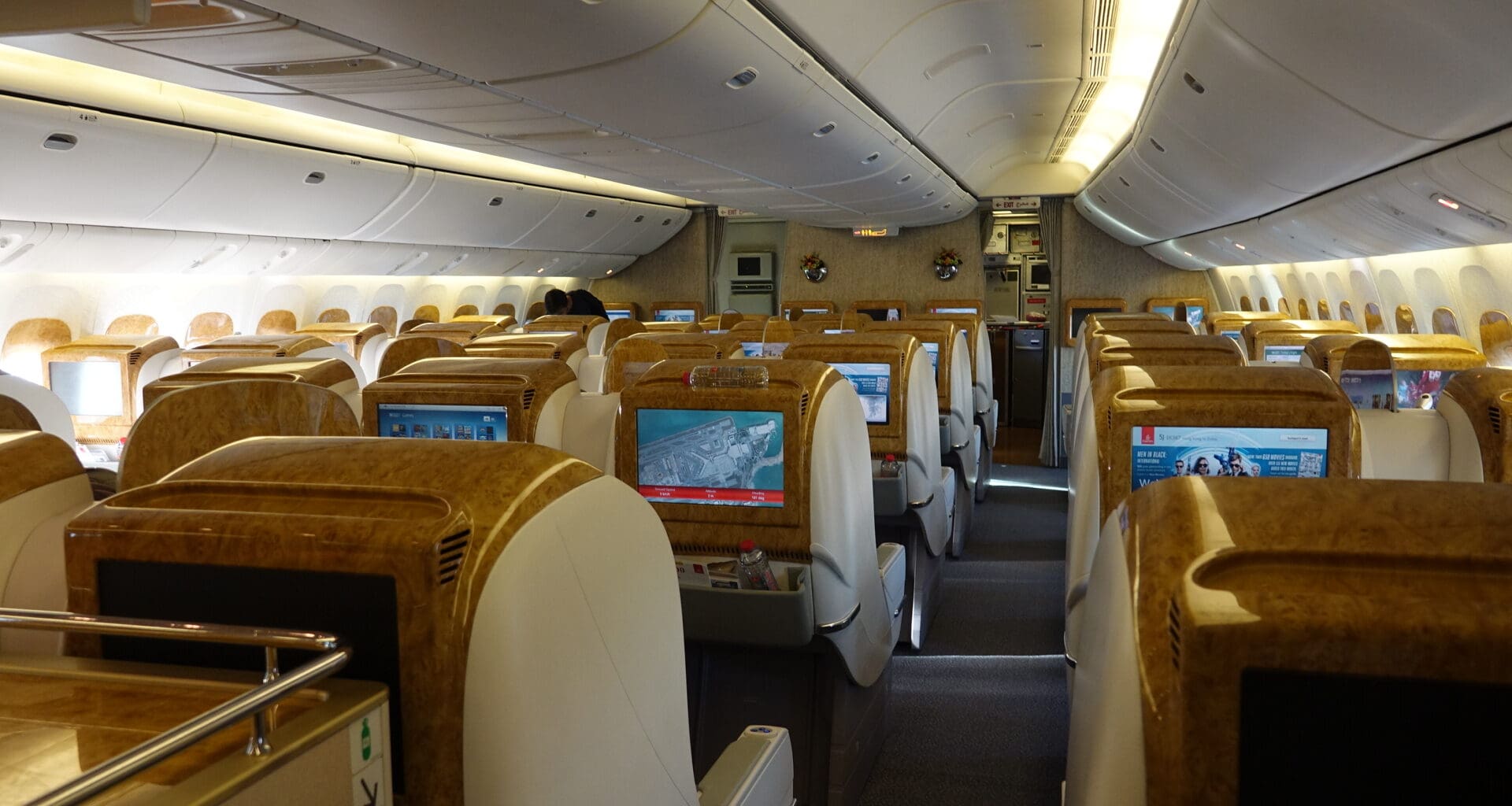
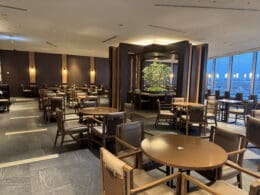
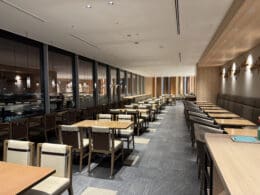
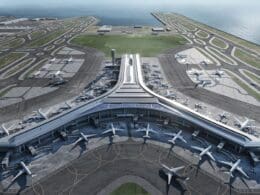
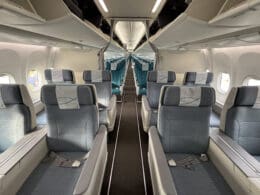
Great post! Although since when does Thai Airways fly to the US?
Where is Sichuan? LAX-CTU(via TNA or HGH) with the same angled seats on HK, but with much worst soft products.
@ rt23456p — This post focuses on products that are underwhelming. On Hong Kong Airlines you expect a staggered seat and get an angled flat bed. Meanwhile Sichuan is just…bad.
They are getting better now, I love there domestic because of the Great lounge food(A La Carte food options), Tea selections, crews, but the hard product is the worst